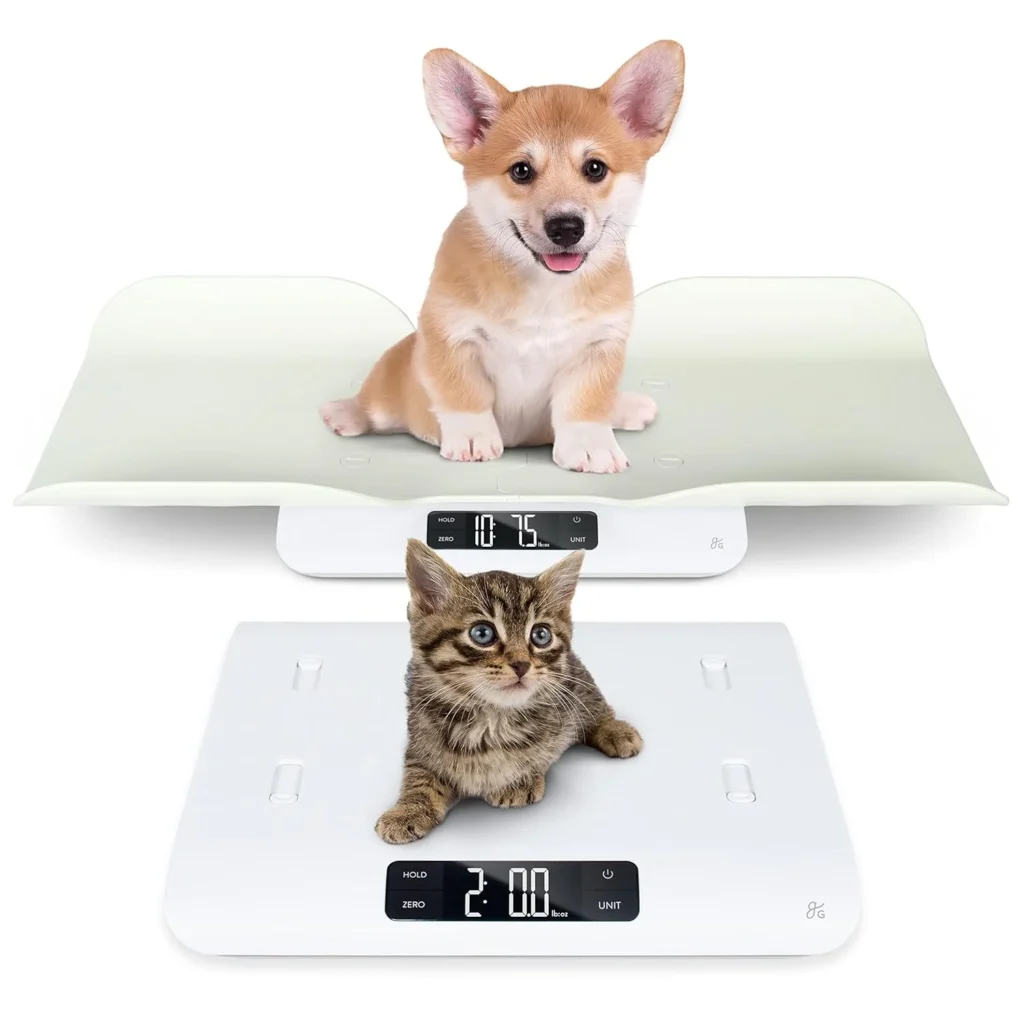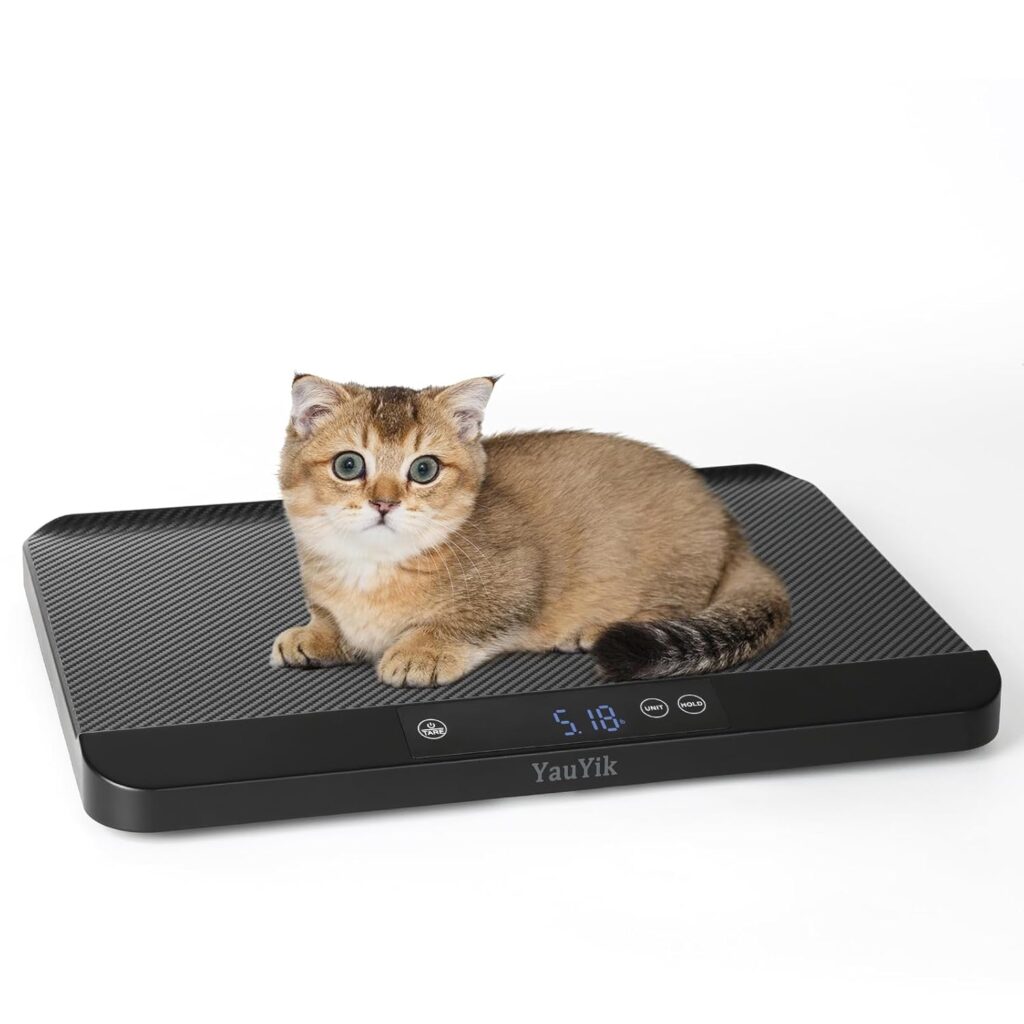Cats come in all shapes and sizes, from tiny Singapuras to massive Maine Coons. With so much variety, it can be tricky to know if a cat is at their ideal weight. This comprehensive guide dives into everything about cat weight, health, and how to use our Cat Weight Calculator for better feline fitness.

Greater Goods Digital Pet Scale
This portable digital scale with an easy-to-read LCD display makes monitoring your cat or small dog’s weight at home simple and stress-free, even if your furry friend likes to wiggle around.
Key Features:
- High Precision Accuracy
- Proprietary Wiggle-Detector Technology
- Convenient Tare Function
- Easy Setup & Portable Design
This calculator and guide provide general information based on veterinary standards. Individual cases may vary. Always consult a veterinarian for specific health advice and before making significant changes to diet or lifestyle. To help us create more feline tools, this site contains affiliate links, which may earn us a small commission at no extra cost to you.
Understanding Cat Weight: More Than Just Numbers
A healthy cat weight isn’t universal. Maine Coons can be perfectly healthy at 8.5 kg (18.7 lbs), while that same weight would be concerning for a Siamese. It’s all about context – breed standards, age, and body structure play crucial roles in determining ideal weight ranges.
Check Out Our Curated Pet Scales for Accurate Weight Monitoring

YauYik Digital Pet Scale
This all-in-one digital scale is ready to use straight from the box with no assembly required, making it perfect for busy pet owners who need quick and reliable weight tracking. Featuring a bright LED display and multi-unit measurement options.
Key Features:
- Ready to Use – No Assembly Required
- High Precision Weighing (30g – 40kg)
- Convenient Hold Function
- Bright LED Display
- Multi-Unit Measurement Options (g, kg, oz, lb)

SIKE Feline Scale, Digital Portable Pet Dog Cat Scale
This versatile digital scale features a large, curved platform that comfortably cradles your cat during weighing, delivering accurate readings in seconds with easy kg and lb unit switching.
Key Features:
- Large Curved Platform for Comfort
- Quick and Accurate Weight Readings
- HOLD Button for Moving Pets
- Easy-to-Use Tare Function
- Multiple Unit Display (kg, lb)
The Current State of Cat Health
Recent studies show that over 50% of indoor cats are overweight or obese. While chubby cats might dominate social media, those extra pounds can lead to serious health complications:
- Painful joint problems
- Increased diabetes risk
- Heart disease
- Reduced lifespan
- Decreased energy and mobility
- Higher veterinary costs
The Cat Weight Calculator: A Simple Tool for Better Health
This easy-to-use calculator helps assess a cat’s weight status and provides personalized recommendations based on veterinary standards.
Using the Calculator
1. Age Input
- Years (0-30)
- Months (0-11)
- For kittens: use 0 years and appropriate months
2. Breed Selection
- Choose from comprehensive breed list
- Mixed breeds: select closest match in size/build
- Common options include Domestic Shorthair/Longhair
3. Current Weight
- Enter weight in preferred unit (kg/lbs)
- Toggle between units as needed
- Measurement tip: weigh yourself with and without holding the cat
Understanding Results
The calculator provides three key pieces of information:
Weight Status (Color-Coded)
- Green: Ideal weight range
- Yellow: Slight adjustments needed
- Red: Immediate attention required
Ideal Weight Range
- Breed-specific target weights
- Age-adjusted for kittens
- Considers body structure
Personalized Recommendations
- Specific advice based on results
- Actionable steps for improvement
- Health considerations
Practical Weight Management Strategies
For Overweight Cats
Food Management
- Measured portions
- Scheduled feeding times
- Quality over quantity
- Wet food options
Activity Increase
- Interactive toys
- Climbing spaces
- Food puzzles
- Play sessions
For Underweight Cats
Dietary Improvements
- High-calorie options
- Frequent small meals
- Appetite stimulation
- Stress-free feeding areas
Health Considerations
- Dental check-ups
- Parasite screening
- Stress reduction
- Environmental enrichment
Special Considerations
Kittens (0-12 months)
Kitten weight management requires special attention:
- Weekly weigh-ins
- Growth-appropriate food
- Regular vet check-ups
- Developmental milestones
Senior Cats (7+ years)
Older cats need adjusted care:
- Modified diets
- Regular health monitoring
- Mobility considerations
- Weight trend tracking
Important Health Notice
While this calculator provides valuable guidance, it’s not a substitute for professional veterinary care. Various factors affect ideal weight:
- Activity levels
- Medical conditions
- Genetic factors
- Environmental influences
- Individual metabolism
Regular veterinary check-ups remain essential for comprehensive health care.
Moving Forward
Maintaining a healthy weight significantly impacts a cat’s quality of life and longevity. The Cat Weight Calculator serves as a valuable tool in this journey, but it’s just one part of overall health management.
Regular monitoring, appropriate diet, sufficient exercise, and professional veterinary care create the foundation for optimal feline health. Weight management isn’t just about numbers – it’s about ensuring our feline companions live their best lives.
